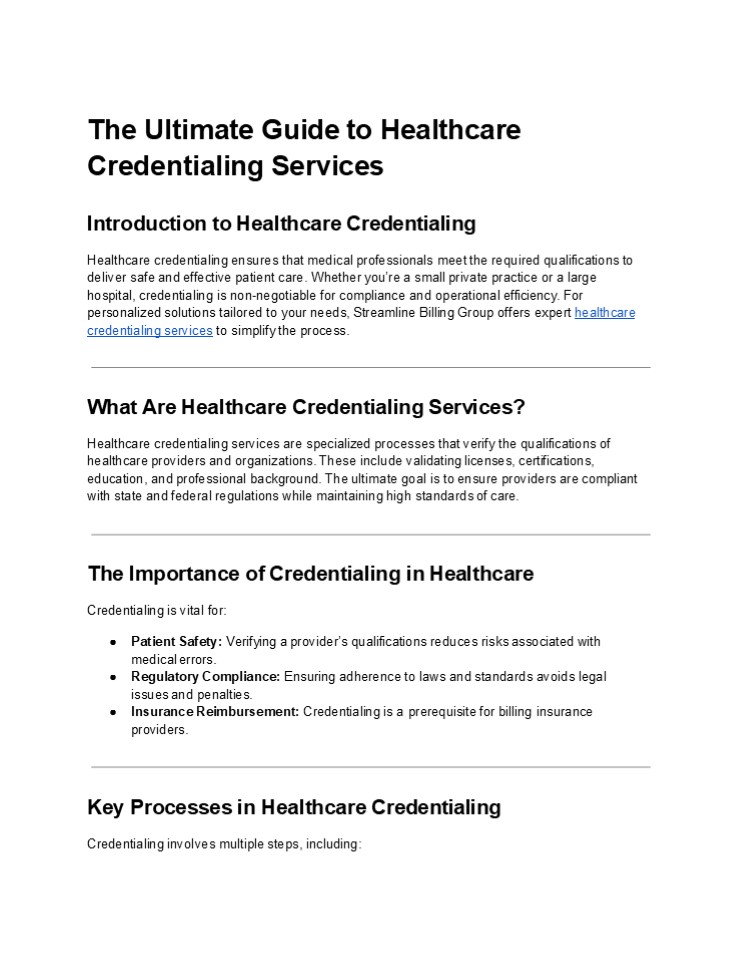Credentialing and Billing Services in 2025 (1) - PowerPoint PPT Presentation
Title:
Credentialing and Billing Services in 2025 (1)
Description:
Insurance credentialing for mental health professionals is a vital process that allows providers to become part of insurance networks, enabling patients to use their benefits. This process involves submitting necessary documents, interacting with insurers, and negotiating terms to ensure timely and accurate reimbursement. Working with a credentialing service saves time, reduces errors, and ensures compliance with state and insurance regulations. Whether you're a therapist, psychologist, or psychiatrist, credentialing helps expand your patient base, build trust, and enhance practice efficiency. – PowerPoint PPT presentation
Number of Views:0
Date added: 21 January 2025
Slides: 6
Provided by:
streamlinebilling
Category:
Medicine, Science & Technology
Tags:
Title: Credentialing and Billing Services in 2025 (1)
1
The Ultimate Guide to Healthcare Credentialing
Services
Introduction to Healthcare Credentialing Healthcar
e credentialing ensures that medical
professionals meet the required qualifications to
deliver safe and effective patient care. Whether
youre a small private practice or a large
hospital, credentialing is non-negotiable for
compliance and operational efficiency. For
personalized solutions tailored to your needs,
Streamline Billing Group offers expert healthcare
credentialing services to simplify the process.
What Are Healthcare Credentialing
Services? Healthcare credentialing services are
specialized processes that verify the
qualifications of healthcare providers and
organizations. These include validating licenses,
certifications, education, and professional
background. The ultimate goal is to ensure
providers are compliant with state and federal
regulations while maintaining high standards of
care.
- The Importance of Credentialing in Healthcare
- Credentialing is vital for
- Patient Safety Verifying a providers
qualifications reduces risks associated with
medical errors. - Regulatory Compliance Ensuring adherence to laws
and standards avoids legal issues and penalties. - Insurance Reimbursement Credentialing is a
prerequisite for billing insurance providers.
Key Processes in Healthcare Credentialing Credenti
aling involves multiple steps, including
2
- Data Collection Gathering licenses, degrees,
certificates, and employment history. - Verification Cross-checking the credentials with
educational institutions, licensing boards, and
references. - Ongoing Monitoring Regular checks to ensure
credentials remain up to date. - For a streamlined workflow, you can explore
Credentialing Tracking Spreadsheets to monitor
key dates and processes.
- Credentialing vs. Privileging What's the
Difference? - Credentialing Focuses on verifying a provider's
qualifications. - Privileging Grants providers the authority to
perform specific procedures or services within a
facility.
- Common Documents Required for Credentialing
- Typical documents include
- State licenses
- Board certifications
- Education transcripts
- Liability insurance proof
- DEA certificates
- Using this spreadsheet template can help you stay
organized when collecting these documents.
Types of Healthcare Credentialing Provider
Credentialing Verifies the qualifications of
individual healthcare providers like physicians,
nurses, and allied health professionals. Facility
Credentialing Validates healthcare organizations
like hospitals, clinics, and surgery centers.
3
Payer Credentialing Ensures providers are
eligible to participate in specific insurance
networks.
How Credentialing Impacts Revenue Cycle
Management Incomplete credentialing can delay
reimbursements, directly affecting cash flow. A
streamlined credentialing process ensures timely
payments and reduces administrative stress.
- Compliance Considerations in Credentialing
- Failing to adhere to credentialing requirements
can lead to - Loss of insurance reimbursements.
- Legal penalties.
- Reputational damage.
- Role of Technology in Credentialing
- Modern credentialing leverages software solutions
to - Automate repetitive tasks.
- Reduce manual errors.
- Track credentialing deadlines efficiently.
Benefits of Outsourcing Healthcare
Credentialing Expertise and Efficiency Credentiali
ng specialists ensure compliance while reducing
the burden on your internal staff. Cost
Savings Outsourcing can be more cost-effective
compared to hiring in-house teams.
4
Faster Turnaround Times Specialized services
often accelerate the credentialing process.
Challenges in Credentialing
- Delays due to missing documents.
- Changing regulations.
- Managing expirations and renewals.
- How to Select a Healthcare Credentialing Service
Provider - When choosing a provider, consider
- Experience in the industry.
- Technology and tools offered.
- Customization of services.
- Pricing structure.
- Client reviews and testimonials.
- Explore trusted providers like Streamline Billing
Group for reliable and comprehensive
credentialing solutions.
Credentialing Timelines How Long Does It
Take? Credentialing can take anywhere from 30
days to 6 months, depending on the complexity and
responsiveness of parties involved.
FAQs About Healthcare Credentialing Services Q
What is the purpose of credentialing?
5
Credentialing verifies the qualifications of
healthcare providers to ensure patient safety and
compliance. Q Can credentialing be done
in-house? Yes, but it is often more efficient and
cost-effective to outsource. Q What happens if
credentialing is incomplete? Delays in
reimbursements, non-compliance penalties, and
legal liabilities are potential consequences.
Conclusion The Future of Healthcare
Credentialing Healthcare credentialing services
are integral to the success of any medical
practice. By streamlining credentialing
processes, organizations can ensure compliance,
optimize operations, and ultimately deliver
better patient care. Outsourcing to trusted
providers, like Streamline Billing Group, while
leveraging helpful tools like this spreadsheet,
will continue to transform the healthcare
industry.































